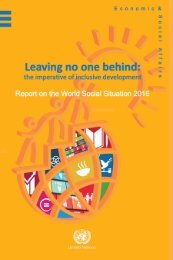Migrant Smuggling Data and Research
zgw9fv2
zgw9fv2
You also want an ePaper? Increase the reach of your titles
YUMPU automatically turns print PDFs into web optimized ePapers that Google loves.
2007).<br />
The journeys most often documented in the literature are those involving<br />
overl<strong>and</strong> transits. In this context, migrants are highly likely to die or sustain injuries<br />
as a result of environmental exposure (Martínez, Cobo <strong>and</strong> Narváez, 2015), face<br />
encounters with criminal groups involved in kidnapping <strong>and</strong> extortion, or arrested<br />
<strong>and</strong> deported by authorities. Not a single country in the Americas maintains<br />
precise records involving migrant fatalities, injuries or assaults, reports <strong>and</strong><br />
numbers being simple approximations of a larger phenomenon. Furthermore,<br />
there is not a unified, government-sponsored system to support the reporting of<br />
migrant related deaths or disappearances, <strong>and</strong> methods to quantify these vary<br />
across regions (IOM, 2014). 109 Yet the disappearance of hundreds of migrants in<br />
transit through Mexico have been documented over a number of years, <strong>and</strong> the<br />
findings of mass graves along the most traversed migrant routes (Izcara Palacios,<br />
2012; Casillas, 2010a) serve as evidence of the lethal nature of many irregular<br />
transits <strong>and</strong> the lack of governmental oversight. <strong>Migrant</strong>s report coming across<br />
human remains in the context of their journeys, or having lost friends or relatives<br />
along the way to the environment, accidents or violence – fatalities that are far<br />
from reflected in official counts. In this context, it is important to highlight that<br />
the dangers faced by migrants in the context of their journeys are not solely the<br />
result of the smuggler’s inability to provide guidance or support, but are also the<br />
result of a combination of factors present in the migrant trail <strong>and</strong> which often<br />
further increase the conditions of vulnerability faced by those in transit (Reineke<br />
<strong>and</strong> Martínez, 2014). Humanitarian organizations along the migrant trail have,<br />
for instance, reported a significant reduction in the number of migrants who<br />
relied on their services <strong>and</strong> stayed at their shelters following the implementation<br />
on the part of the Government of Mexico’s Plan Frontera Sur (REDODEM, 2014),<br />
a change that suggests migrants opted for more hidden, remote routes in order<br />
to avoid detections. While the Plan was advertised as a mechanism to enhance<br />
the protection of migrant human rights, some organizations have noted it has<br />
instead led to the arrest <strong>and</strong> deportation of larger number of migrants <strong>and</strong><br />
further increased their vulnerability (Guevara, 2015; WOLA, 2015).<br />
In summary, irregular migration routes in Latin America run from south to<br />
109<br />
The efforts involving civil society – including the friends <strong>and</strong> families of missing <strong>and</strong> dead migrants – at<br />
creating a mechanism that allows to account for missing <strong>and</strong> dead migrants must be acknowledged.<br />
Multiple groups across the Americas, in collaboration with community organizations within the United<br />
States <strong>and</strong> along the United States–Mexico border, have embarked in a series of continental, regional <strong>and</strong><br />
local efforts to devise st<strong>and</strong>ardized mechanisms that have allowed for the location of missing migrants <strong>and</strong><br />
the identification <strong>and</strong> recovery of human remains so that they can eventually be returned to their relatives.<br />
The work of Centro Colibrí in Tucson, Arizona, the Committee of Missing <strong>Migrant</strong>s’ Families from Progreso<br />
in Honduras, <strong>and</strong> the Argentine Forensic Anthropology Team, among many others, has been central in this<br />
effort.<br />
<strong>Migrant</strong> <strong>Smuggling</strong> <strong>Data</strong> <strong>and</strong> <strong>Research</strong>:<br />
A global review of the emerging evidence base<br />
277
















